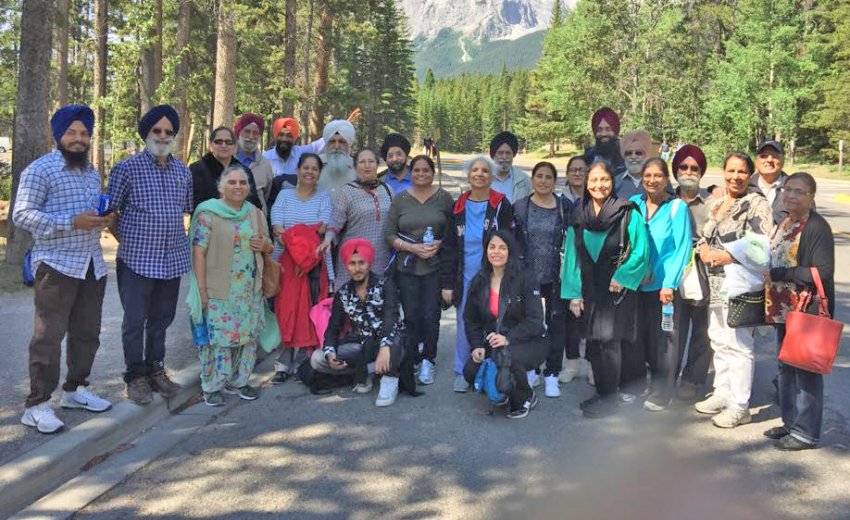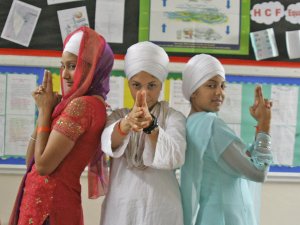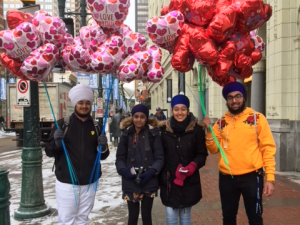It was a Sunday afternoon, I was complacently happy with our Punjabi school students after their recitation of Kirtan and speeches to the Sangat. They had practiced with unabashed enthusiasm and were giddy with relief and euphoria of a job well done – the kind of euphoria that only children can feel! I ushered the giggling bunch into the inner lobby of the Gurdwara. It was time for them to go to the Langar Hall, to enjoy the hot, yummy Langar and then to do Seva afterwards.
Although I had every intention to do so, I didn’t join them.
I was beckoned towards the sunlit seating area by the front entrance. Although it is an airy, sunny space with modern furniture and a picturesque 180-degree view of the pine-tree-lined perimeter of the Gurdwara, this area has always been chilly, with inadequate insulation around the windows to protect from cold winter days in Calgary. On hot summer days, it is like a sauna, the greenhouse effect of the surrounding windows making the space too hot to linger in.
A favorite Aunty Ji of mine gestured to me to sit next to her. Shivering, I gathered my dupatta around me and sat on the cold leather seat. She was cold too, I could feel the frigidity in her hands as she enveloped mine in hers.
Aunty Ji: “Beta, you are doing such a good job with the children. The Punjabi school seems to have grown and I see more kids are coming now than before.”
Me: “Thank you Aunty Ji, it is through the Grace of God, Waheguru Ji di Kirpa.”
Aunty Ji: “The children are well taken care of. I can see that. But I have been meaning to talk to you for a long time. I want to know, who is taking care of the Seniors? Who is taking care of the elderly Sangat who have no place to sit except in this cold veranda? You have forgotten us, you have forgotten me, your Aunty.”
Me: My complacent happiness immediately dissipated - there were several responses that came to mind - but ultimately, I was Speechless…
It was a good thing that I was speechless that day, because there were no adequate words to answer her question. The truth was indisputable, we were two ladies sitting and shivering in a frozen ‘veranda’, discussing the success of one constituency while ignoring the needs of the other. How is that a successful outcome?
This conversation forced me to ponder an exercise I have been academically trained in, but up to that point, practically impoverished in - empathic engagement.
What is empathic engagement? It is simply a methodology of listening. It requires opening the mind, literally putting yourself in the place of the speaker, and seeing the world from their eyes, from their world view. It requires feeling their pain, experiencing their joy. It requires leveraging on emotional intelligence skills, reading between the lines, gently coaxing for more insight - to understand the speaker and to really distill the essence of the true message. I would emphasize the elements of our Sikh faith in this exercise, and that is to come from a place of Love and Compassion, Pyaar and Daya when practicing empathic engagement.
I put this exercise to practice hours later by revisiting my conversation with Aunty Ji in my mind, and concluded that what she was saying was this:
“I feel marginalized, my needs are not considered, my voice does not matter.”
As I reflected on sitting on that cold, leather chair, in the chilly foyer, it became obvious that what she said was true. How could I be so deaf to the voices of the elderly?
I talked to her many times again after that. Her true fears bubbled slowly to the surface, in metaphorical and oblique language, but using the skills of empathic engagement, I heard her message. It was apparent that loneliness, illness and social isolation were the real ailments, not just for her but for many seniors in our community. This may sound obvious to you, dear reader, but it is not always so to everyone, otherwise there would have been robust programs already in place.
Let’s pivot back to empathic engagement for a moment to tie this concept back to how a ‘corporate practice’ can aid in Gurdwara operations. Part of running any organization, is understanding the ‘target’ audience or ‘client’. This requires gathering market intelligence, perhaps through surveys and questionnaires and leveraging historical data to understand patterns of behavior. I have learned that this cannot be a reactive exercise, it must be a proactive exercise.
In the Gurdwara, our beloved Sangat is our ‘audience’. Do we do enough to create opportunities for interactive communication? Do we create spaces to build mutual understanding, trust and goodwill built on empathy and openness? If these measures are taken, it will be possible to harvest a deep understanding the needs of our Sangat, allowing Gurdwara committees to effectively create programs that are ‘customer service’ oriented. Empathic engagement is just one tool that allows for interactive communication with the target audience. Although it’s a process that takes time, it can be learned by anyone, and simple training and practice can hone this skill. It’s easy enough to set up workshops to facilitate this to help Gurdwara committees add this to their toolbox.
Happily, we did put a Senior’s program in place eventually and have achieved some metrics of success! Last year, a busload of Senior members of the Sangat took a trip out to the nearby mountains of Banff! In addition, every Wednesday at the Gurdwara, the Senior’s group meets for Santhya classes followed by Langar, where they also celebrate one another’s birthdays and wedding anniversaries. Although there is some momentum, there is still much work to be done to take this fledgling initiative into full-grown-wings status. The intent and effort are there, supplemented by the service of dozens of Sevadars.
In closing, and in choosing to come from a place of vulnerability and gratitude, and I leave you with an observation. True empathic engagement requires personal development and an open heart. From my own experience, as I ventured into this endeavor, it required shedding some vices and embracing some virtues, which itself is a continuous, common journey for all of us.
I learned that authentic empathic engagement meant that I needed to be diligently non-judgemental - by whittling away the hard edge of Ahaunkaar (ego) and carve out the decay of Moh (attachment). My daily prayer was and continues to be to become boundless in Daya (compassion) bathed in Pyaar (love) and that all thoughts be borne of Namrata (humility). I believe that with this kind of personal growth, we can truly listen to all voices with an authentic ear – and practice empathic engagement.





